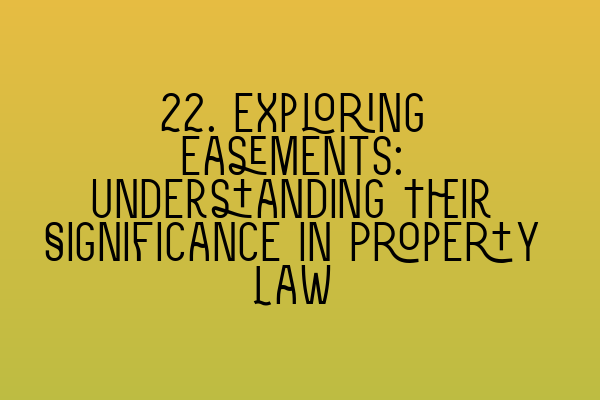22. Exploring Easements: Understanding Their Significance in Property Law
Welcome to the SQE Property Law & Land Law blog! In this post, we will be diving into the fascinating world of easements and unraveling their importance in property law. If you’re studying for the SQE 1 or SQE 2 exams, or simply interested in expanding your knowledge in this area, this article is for you. So, let’s get started!
What are Easements?
Easements are legal rights that grant certain privileges or access to a person or entity over another person’s land. These rights are non-possessory and can be attached to a particular piece of land rather than to an individual. Simply put, an easement allows someone to use or enjoy land that they do not own.
There are different types of easements, including:
- Right of Way: This is the most common type of easement and grants someone the right to pass through another person’s land.
- Support: This easement provides the right to have the land next to a building support the weight of that building.
- Light and Air: A light and air easement ensures that certain openings in a building, such as windows, remain unobstructed.
- Water and Drainage: This easement allows access to water sources or drainage systems located on another person’s property.
- Conservation: A conservation easement restricts certain activities on a piece of land to promote conservation efforts.
Significance of Easements in Property Law
Easements play a crucial role in property law for a variety of reasons:
- Property Rights: Easements allow for the balancing of property rights between the owner of the land and the holder of the easement. By granting specific rights to the easement holder, property owners can still enjoy exclusive ownership while accommodating the reasonable needs of others.
- Access: Easements provide necessary access to landlocked properties. For instance, if a piece of land is only accessible through another person’s property, an easement can ensure that the owner can still reach their land without obstruction.
- Utilities: Easements often come into play when it comes to utility providers, such as gas, water, or electricity companies. These companies may require an easement to access certain parts of a property for maintenance or installations.
- Preserving Historical Sites: Some easements are granted to preserve historical buildings or sites. These easements can restrict certain activities that may degrade the historical significance of the property, ensuring its preservation for future generations.
Creating and Enforcing Easements
In order for an easement to be created, certain legal requirements must be met. Generally, easements can be created through:
- Express Grant: This occurs when the landowner voluntarily grants an easement to another party through a written agreement.
- Reservation: A reservation occurs when a landowner sells a portion of their land but retains an easement to access the remaining land.
- Implication: An easement can be implied when it is necessary for the use or enjoyment of the land. This is typically determined by the court based on the circumstances.
- Prior Use: If an easement has been consistently used for a long period of time, it may become a legal right through prescription. This is known as an easement by prescription.
Once an easement is established, it must be properly recorded and registered to provide notice to interested parties. Failure to register an easement could result in disputes and complications in the future.
Conclusion
Easements are a vital aspect of property law, balancing the rights of landowners and easement holders. They provide essential access, utilities, and protections to ensure the effective use and enjoyment of land. Understanding the various types of easements and the legal process for creating and enforcing them is essential for property law practitioners and aspiring solicitors preparing for the SQE exams.
We hope you found this article informative and valuable in your studies or professional endeavors. If you’re interested in furthering your knowledge in property law or seeking preparation materials for the SQE exams, be sure to check out our related articles:
- SQE 1 Practice Exam Questions
- SQE 1 Practice Mocks FLK1 FLK2
- SQE 2 Preparation Courses
- SQE 1 Preparation Courses
- SRA SQE Exam Dates
Thank you for reading! If you have any questions or would like to discuss property law further, please don’t hesitate to get in touch with SQE Property Law & Land Law. We’re here to help!
